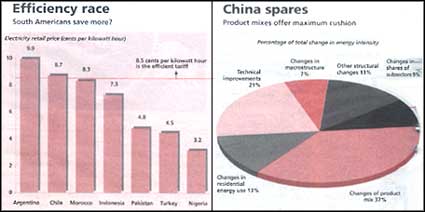Energy synergy
 In a worldwide search for sustainable development, the energy sector seems to be a viable target for radireform. Even in the dominant coal-fired power industry, much thought has gone into reducing carbon emission for unit power generation. The OECD countries, over this century, have shown a good result on that count. B, fiscal manipulation turns out to be the most effective tool for reaching an efficient power consumption pattern. Environmental economists all over the viorld have recommended an end to energy subsidy that only encouragM more consumption and hence, more carbon emission. The developing countries, though a bit late, have als started pricing adjustments of energy. Countries like Argentina and Chile hope to achieve an efficient price AD 2000, while Nigeria, Turkey and Pakistan will keep subsidising wasteful and cheaper electricity.
In a worldwide search for sustainable development, the energy sector seems to be a viable target for radireform. Even in the dominant coal-fired power industry, much thought has gone into reducing carbon emission for unit power generation. The OECD countries, over this century, have shown a good result on that count. B, fiscal manipulation turns out to be the most effective tool for reaching an efficient power consumption pattern. Environmental economists all over the viorld have recommended an end to energy subsidy that only encouragM more consumption and hence, more carbon emission. The developing countries, though a bit late, have als started pricing adjustments of energy. Countries like Argentina and Chile hope to achieve an efficient price AD 2000, while Nigeria, Turkey and Pakistan will keep subsidising wasteful and cheaper electricity.
While looking for a radical solution towards energy efficiency, a Chinese study reveals an interesting possibility of reducing energy consumption by 37 percent just by changing the product mix of the country.
Related Content
- The role of e-fuels in decarbonising transport
- Country climate and development report: Mozambique
- Addressing tradeoffs between energy transitions and SDGs through G20 partnerships: an ‘inequality’ perspective
- Climate change mitigation in the East and Southern Africa region: an economic case for the agriculture, forestry and land use sector
- Pacific perspectives 2022: accelerating climate action
- Enhancing China’s ETS for carbon neutrality: focus on power sector
